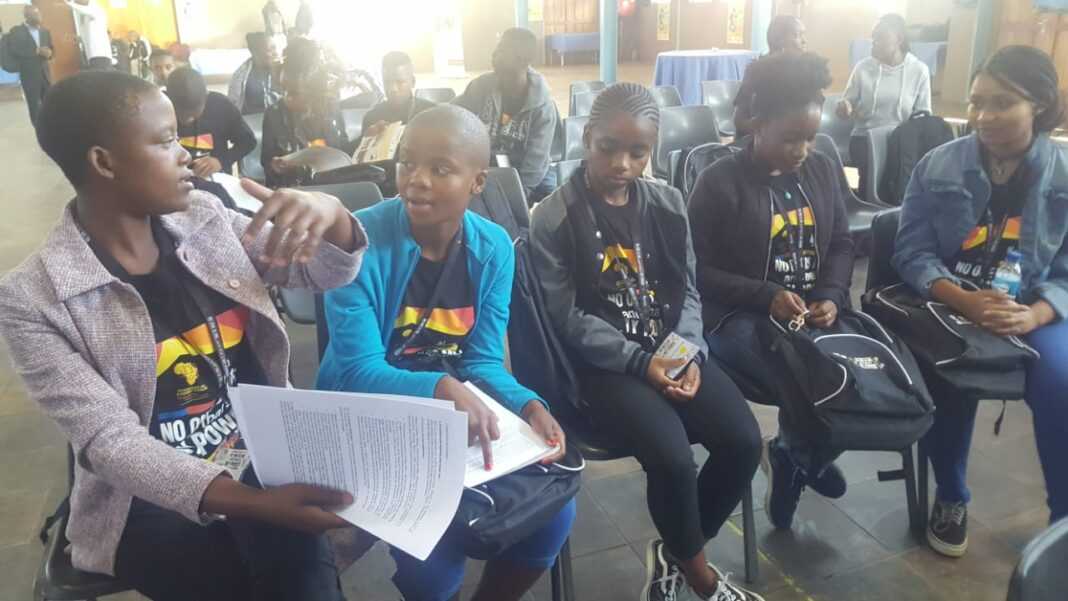Lerato Matheka
Delegates of the 2019 Psychosocial Support Forum that convened in Namibia in August have stressed that meaningful engagement of girls, boys and youth is critical for their empowerment.
We the delegates at the 2019 PSS Forum comprising of experts from Government Ministries and Departments responsible for Children and Youth, health, education and skills development from East Africa Community Partner States and Southern Africa Development Community Member States, International cooperating partners, civil society, academic partners, children and youth from 25 countries around the world , including journalists who met to deliberate on ethical reporting about children have an understanding of the benefit of PSS interventions for girls, boys and youth, where PSS is a continuum of love, care and protection that enhances the holistic development (cognitive, social, emotional, spiritual and motor skills) of a person and strengthens their social and cultural connectedness and resilience.
Therefore, we emphasise strongly that the meaningful engagement of girls, boys and youth is critical for their empowerment and overall wellbeing, noting that the holistic nature of psychosocial and mental wellbeing requires that psychosocial support is appropriately, adequately and consistently provided through home, family, school, friends, community, local and national services.
The emphasises was shared through a communique where the delegation agreed that they recognise that African girls, boys and youths psychosocial and mental wellbeing are affected by factors such as HIV, neglect, poverty, conflict, disability, stigma and discrimination of minority populations; limited access to health and social services; child marriages; teen parenting; child abuse; cyber bullying; and broader child protection issues; and that parents and care givers of children and youth are affected by similar factors.
We are convinced that collective efforts by Governments, Regional Economic Communities, Development Partners, Civil Society, Religious Organizations, the Private Sector and communities can bring about comprehensive psychosocial and mental wellbeing of girls, boys, youth, their families, caregivers and communities by addressing risks and strengthening protective factors for thriving and health functioning; Given the 2019 Forum theme and we acknowledge guidance on PSS as articulated in the international instruments.
We have identified that a major barrier in effectively and efficiently addressing issues affecting children and youth is poor coordination at all levels between different sectors (and within sectors) that focus on children and youth.
The forum therefore issues the following resolutions and recommendations based on the objectives to break barriers and create sustainable connections in mental health and psychosocial support (MHPSS).
We call upon decision and policy makers;
- To align national laws and
policies with international, continental and regional frameworks and best
practices to protect the psychosocial and mental wellbeing of children and
youth. - To show leadership to promote
coordination of efforts and develop a SADC protocol on rights and wellbeing of
children and young people. - To recognise the linkages between
psychosocial support and mental health in interventions targeting children,
youth and caregivers to build their resilience. - To allocate resources for MHPSS
and increase transparency on MHPSS spending. - To create conducive legal and
policy environments to harness the potential of technology to strengthen MHPSS
innovations and interventions. vi. To create legal and policy environments that
protect children and youth when using different technologies. - To commit to inclusivity of
children and youth in MHPSS decision making processes and in MHPSS policy development
and interventions. - To create comprehensive
safeguarding policies to protect children and youth. - To support the implementation and
prioritisation of Comprehensive Sexuality Education to ensure improved health
and education outcomes for children and youth. - To create comprehensive laws to
address stigma and discrimination of children and youth affected by HIV, living
with disabilities and those in vulnerable and minority groups.
The forum called on governments to strengthen the policy framework to go beyond the marriage laws and prioritise other sectoral laws relevant to issues of ending child marriage, that is, education, health and social service, as well as to use research based evidence in Mental Health and Psychosocial Support (MHPSS) policy development.
We call upon implementers (Programmatic) to provide PSS to build the mental health, psychosocial wellbeing and resilience of pregnant adolescent girls, young mothers and fathers and their children, while proactively promoting psychosocial and mental wellbeing of young girls and boys in order for them to effectively apply knowledge on sexual and reproductive health and rights.
They concluded that there was a need to collaborate, network and encourage research and documentation on MHPSS in the region so as to promote the transfer of MHPSS best practices between national governments, agencies, regional bodies and global institutions.
This will help promote social cohesion and empower communities to address harmful practices and attitudes that impact the psychosocial and mental wellbeing of their members.
We advise governments to prioritise a range of interventions for girls who experienced child marriage, especially skills for social and economic empowerment, and PSS while also offering education, vocational training and economic empowerment to adolescents and youth for self-reliance.
It highlighted that to pursue best practice for the Social Services Workforce in the region to ensure quality programmes and services, there was a need to harness the potential of child friendly technology and other innovations to improve implementation of PSS interventions.
The forum further resolved a need to strengthen MHPSS capacity of local frontline responders including local law enforcement, health care providers, humanitarian and emergency responders as well as to improve MHPSS preparedness and response taking into account stressors and shocks such as climate change and others.
We will work towards realization of these resolutions in the next two years and report on progress at the next Regional PSS Forum in 2021, the forum committed.




